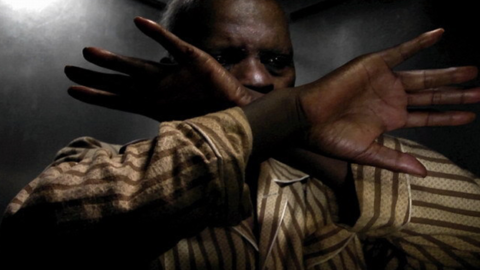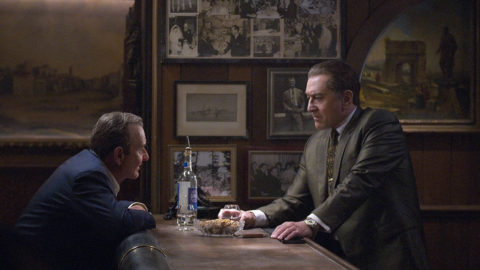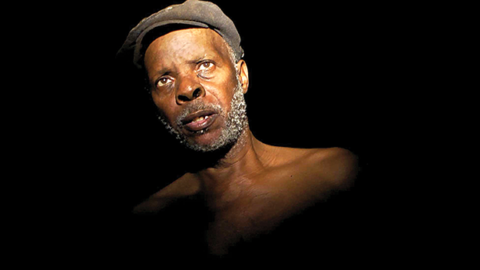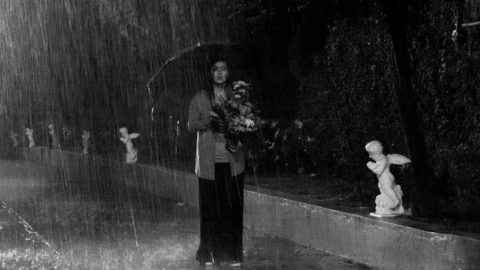Interview Excerpt: Pedro Costa
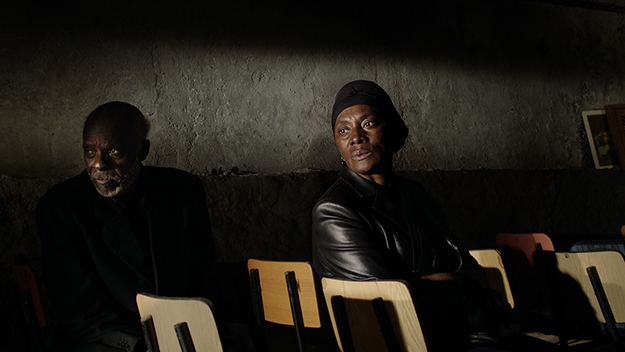
Vitalina Varela (Pedro Costa, 2019)
This interview with the director of Vitalina Varela took place at the Locarno Film Festival where Pedro Costa was awarded the Golden Leopard and Vitalina Varela won the award for best actress. The full interview will appear in the November-December 2019 issue of Film Comment.
Early in Pedro Costa’s 2014 film Horse Money, a Cape Verdean woman named Vitalina recounts in detail the heartrending story of her late arrival to her estranged husband’s funeral in Lisbon. It’s an unforgettable moment in a film that, while centered primarily on Costa’s frequent collaborator Ventura, announced an unexpectedly vital new figure in the Portuguese director’s work. Indeed, five years on, it’s Vitalina’s presence and performance that lingers most in the mind. Costa’s new feature, Vitalina Varela, returns to this story, dramatizing Vitalina’s arrival to an impoverished neighborhood in Lisbon and the painful process of reconciling the memory of her husband with the man she learns led a duplicitous life in her absence.
Just days before it won the Golden Leopard in Locarno, Costa and I spoke about the ghosts that haunt the film and the importance of doing good work.
Let’s start with the house. It feels haunted to me, and not only by Vitalina’s husband.
One of the starting points for the film was locating a house in that neighborhood, which is an African, Cape Verdean neighborhood in Lisbon. I was looking for real houses from real Cape Verdeans, similar to the interiors in Horse Money, because I didn’t want to redecorate a house in that style. I asked a friend who lives there, who said, “Oh, I have this perfect house that looks completely Cape Verdean. But the problem is the guy who used to live there died, and the house is empty. But let’s go—perhaps we can go through the back.” And while he was telling me this and we were approaching the house, I saw the door open and Vitalina came to the doorstep, dressed in black, exactly like one of the shots in the film. So there you have it. Immediately, I was fascinated by her face. But she was fearful—not of him, but of me: like, “Who is this guy, police or something?” That’s how we met.
This was five or six years ago?
This was 2013. When we met I explained what I was doing. I don’t know if she understood completely, but I said things like “interior,” “house,” “film,” et cetera. Immediately she opened the door—she was very nice. But when we left I wanted to know more about her. No one knew exactly who she was; it felt like no one wanted her there. I went back a week later and shot in the house and asked her if I could take a photo of her; she agreed and she ended up in the film. Ventura came with me and when they started talking they discovered that they were related a little bit, like distant cousins. So that made it more comfortable for her. When she did the part in Horse Money where she tells the beginning of her story, I felt that I would love to do something with her as a main character. After Horse Money I went back and stayed with her for many days, and she explained what had happened to her. I began… not taking notes, but talking about a lot of things. I felt like she could do it, and she wanted to, even if only to occupy herself, because she didn’t work at that time.
There are a number of people in the film besides Vitalina, non-actors, locals from the neighborhood. I’m curious how and at what point you feel comfortable and confident enough to ask them to be your film, and how that conversation evolves?
Well, with Vitalina it took a long time—not to convince her, but to convince me that it was possible: how to do it, how to organize it, how to structure it. Because in the beginning I thought that this film could be a little bit wider, a bit more open, and that perhaps there could be something shot back home, when she was younger, that happy part of her life—something sunny, in the open air. But I think she wanted to stay in this moment, this moment of grief, of mourning. So I decided we would shoot completely inside, more or less. There was always this idea that she would go to the grave, but it would be inside, it would be dark. As she says, “the windows are holes.” So it was just a way of convincing me and her that maybe we could do it, that she could perhaps talk about it, and I could perhaps film it. But I wasn’t sure. For me this was a bit more difficult than the other films—not because she wasn’t getting there, or not wanting to work, but because of me. How can I explain… even if I insist that everything is true and real, this story is still less fantastical. There’s less fantasy if you compare it with Horse Money. It has a different kind of pain or suffering. Just the fact that it belongs or comes from a woman gives it a certain gravity that Ventura—or perhaps men—cannot carry.
Jordan Cronk is a critic and programmer based in Los Angeles.



